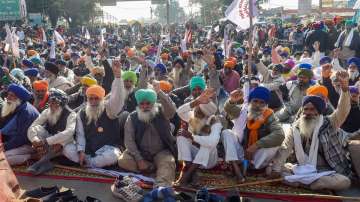When the farmers launched the 'Delhi Chalo' protest on 26 November 2020, no one had expected the agitation against the farm laws to continue for 72 long days. But it has not only reached a stalemate between the farmer leaders and the government but also has snowballed into a perception war threatening to disrupt the image of India.
After the Rihanna and Greta Thunberg episode, the government has sent out a strong message advising the celebrities and others to refrain from giving in to the temptation and sensationalism on social media and making inaccurate and irresponsible statements and hashtags.
On the back of it came the US administration's mixed remarks which welcomed farm reforms hailing the peaceful protests yet called for unhindered access to information and internet at the protest sites after government restrictions in the wake of the Republic Day incidents.
Taking a firm stand, India reminded the United States of the rioting at the Capitol Hill on 6 January 2021 and said that the 26 January violence at the Red Fort is also being addressed as per the law of the country.
Essentially, in a pandemic time with the crucial vaccination drive underway, the government seems to be following a two-pronged strategy to end the deadlock: reaching out to the farmers to bridge the trust deficit on the farm laws and beating the disruptive forces that are trying to take advantage of the situation.
The farmer unions, however, are adamant on the repeal of three farm laws and seek a guarantee on the retention of Minimum Support Price (MSP). As things stand, the government, including Prime Minister Narendra Modi, has time and again assured the farmers that the MSP system will continue. But the farmers want it hardwired in law, despite the fact that MSP has always been a part of administrative decisions, not an act.
On the implementation of the contentious farm laws, the Supreme Court has ordered a stay hoping that it will end the protest. But it did not pay off. Eleven rounds of talks between the Centre and farm leaders have failed to make any breakthrough. Even the Centre's proposal to suspend implementation of the laws was rejected by the farm union leaders.
The irony is that the government believed the new farm laws will double farmers' income by 2022, but they are not ready to buy them.
WHAT ARE THE THREE FARM LAWS
First farm law, titled 'The Farmers' Produce Trade and Commerce (Promotion and Facilitation) Act, 2020', deals with the trade areas of farmers' produce. It permits sale and purchase of farm produce outside the premises of APMC mandis without any market fee, cess or levy. It includes electronic trading and e-commerce of farm produce.
The act may hurt the interests of middlemen and affect state coffers, not at all the farmers. But this law is a major bone of contention. The protesters believe that once the law comes into effect the agricultural produce market committees (APMCs) will be abolished ending their MSP benefits as well.
Second farm law, named 'Farmers (Empowerment and Protection) Agreement on Price Assurance and Farm Services Act, 2020', provides a legal framework for contract farming. In which the farmers can enter into agreements with agri-business firms, retailers or exporters for their produce at a mutually agreed price before the planting seasons. The act also outlines a dispute redressal mechanism but the farmers have issues with some clauses. Though, the government has promised to look into the clauses. The farmers want the law to go.
Third farm law is an amendment to an existing act called 'Essential Commodities (Amendment) Act, 2020'. The law scraps the Centre’s powers to impose stock-holding limits on food items like cereals, pulses, potato, onion, edible oilseeds and oils, removing them from the list of essential commodities, except under extraordinary conditions or in case of a steep price hike. The law won't affect the farmers adversely. But along with the first two laws, the farmers are not willing to accept this also.
Now one can only hope that the next round of talks between the Centre and farmers break the impasse. Before that, there is an urgent need to dial down the temperature in the national capital. On the contrary, the farmer unions have called for a countrywide 'Chakka Jam' on 6 February. And the protesters do not seem in a mood to relent.
(Disclaimer: The opinions expressed in this article are those of the author. They do not reflect the views of India TV )
Latest India News
